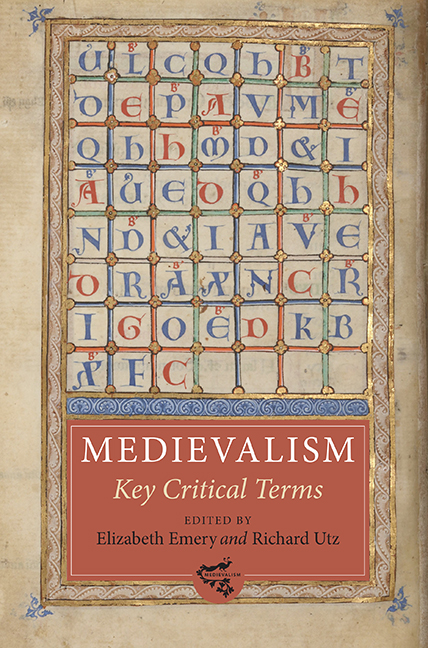Book contents
- Frontmatter
- Dedication
- Contents
- List of Illustrations
- List of Contributors
- Making Medievalism: A Critical Overview
- 1 Archive
- 2 Authenticity
- 3 Authority
- 4 Christianity
- 5 Co-disciplinarity
- 6 Continuity
- 7 Feast
- 8 Genealogy
- 9 Gesture
- 10 Gothic
- 11 Heresy
- 12 Humor
- 13 Lingua
- 14 Love
- 15 Memory
- 16 Middle
- 17 Modernity
- 18 Monument
- 19 Myth
- 20 Play
- 21 Presentism
- 22 Primitive
- 23 Purity
- 24 Reenactment
- 25 Resonance
- 26 Simulacrum
- 27 Spectacle
- 28 Transfer
- 29 Trauma
- 30 Troubadour
- Index
- Medievalism
25 - Resonance
Published online by Cambridge University Press: 08 October 2022
- Frontmatter
- Dedication
- Contents
- List of Illustrations
- List of Contributors
- Making Medievalism: A Critical Overview
- 1 Archive
- 2 Authenticity
- 3 Authority
- 4 Christianity
- 5 Co-disciplinarity
- 6 Continuity
- 7 Feast
- 8 Genealogy
- 9 Gesture
- 10 Gothic
- 11 Heresy
- 12 Humor
- 13 Lingua
- 14 Love
- 15 Memory
- 16 Middle
- 17 Modernity
- 18 Monument
- 19 Myth
- 20 Play
- 21 Presentism
- 22 Primitive
- 23 Purity
- 24 Reenactment
- 25 Resonance
- 26 Simulacrum
- 27 Spectacle
- 28 Transfer
- 29 Trauma
- 30 Troubadour
- Index
- Medievalism
Summary
WHILE THE METAPHOR of resonance can be applied beyond sound, this essay limits itself to discussing the idea of the resonance of medieval music and ritual in modern music and ritual practices. Depending on one's understanding of the notions of music and ritual (and the Middle Ages), it must first be acknowledged that modern practices directly access neither medieval music nor medieval rituals; at most they can sometimes be found to resonate. Any attempt to reconstruct a medieval ritual practice or musical performance encounters fundamental obstacles that make the reconstruction as much a creative as a scholarly effort. Even the most reliable and detailed sources (musical scores, liturgical manuscripts, narrative sources, or combinations of such documents) provide only vague notions of tempo, timing, sound, or of movements and gestures in the performative event constituted by the ritual or musical performance. Therefore, musicians and musicologists do not assume or expect authenticity of modern performances of medieval or other so-called “early” music (this may include music up to the time of Mozart, Beethoven, and the early Romantics). Today, in the so-called early music revival, the term “historically informed performance practice” characterizes modern attempts to implement current knowledge about earlier practices of music in contemporary performances.
The problems concerning medieval ritual are of a similar order. Not only is it difficult to get close to details about how specific rituals were actually carried out (for similar reasons as medieval musical performances), but as with “music,” it is not clear how to define or delimit the notion of the “ritual.” Nevertheless, the problems become less daunting when one leaves behind abstract discussions and focuses on specific and well-defined areas. Looking at medieval music connected to medieval liturgical practices like the mass or the Divine Office provides a framework for discussing the impact of such rituals and their music on modern composers and even on modern liturgical practices. Furthermore, the chant of medieval liturgical ceremonies has traditionally been understood as the beginning of Western music history in academic musicology.
In this article I shall deal with resonances of medieval chant and hymns in three areas of music performance: 1) within modern Protestant Lutheran mass liturgy; 2) among composers of so-called avant-garde music; and 3) within modern performance practice of medieval liturgical music. I shall do this by way of three short case studies.
- Type
- Chapter
- Information
- Medievalism: Key Critical Terms , pp. 215 - 222Publisher: Boydell & BrewerPrint publication year: 2014



